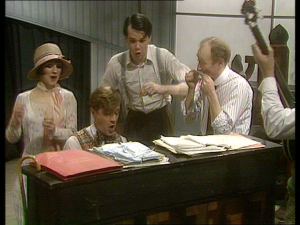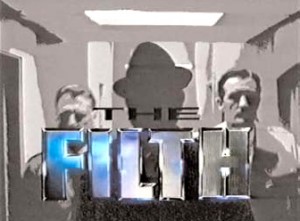by DAVID ROLINSON
Nine parts. Writer: Alan Plater; Adapted from (novel): J.B. Priestley; Music by: David Fanshawe; Producer: Leonard Lewis; Directors: Bill Hays, Leonard Lewis

A “tuneful tonic of merriment and mirth”, The Good Companions is a nine-part Yorkshire Television serial about a touring concert party adapted from J. B. Priestley’s famous 1929 novel.1 It was adapted by Alan Plater, who described the serial as one of his happiest working experiences, but added that it was “interesting but flawed, and didn’t really catch on”.2 That’s a fair assessment, but the serial is certainly more interesting than flawed. Like the two previous film adaptations, the serial risked being written off as undemanding, suffering in part because of the reputation of the source novel. Writing about the 1933 film version, Charles Barr observed that the novel “never had much currency in academic circles”, with supportive opinions outweighed by the impact of “the vinegary attacks on the book and the novelists by the two Leavises”.3 Priestley himself argued that “[s]ome severe critics dislike” stories in the picaresque tradition of “huge wandering tales” as these are “too rambling and easy for them”.4 However, the serial’s ability to parallel the book’s feel-good, episodic qualities is also one of its main strengths. With composer David Fanshawe setting Plater’s lyrics to a variety of song styles, and a lively ensemble cast relishing on-stage music hall scenes and off-stage full production numbers, this is a witty and unashamedly fun serial. The Network DVD release also comes with the 1980 tie-in documentary On the Road, in which Plater interviews Priestley, compares the serial with previous film versions and provides behind-the-scenes footage.5
The Good Companions, tx. ITV, 14 November 1980-16 January 1981. Now available on DVD from Network DVD. ↩
Alan Plater, Doggin’ Around (Northway, 2006), p. 99. ↩
Charles Barr, ‘The Good Companions’, in Brian McFarlane (editor), The Cinema of Britain and Ireland (London: Wallflower Press, 2005), p. 31. ↩
J.B. Priestley, in Priestley and O.B. Davis, Four English Novels (Harcourt Brace, 1960), p. 262. ↩
According to production files relating to On the Road, which are available in the Alan Plater archive in the Hull History Centre, the documentary’s location visits happened in the last week of July 1979. ↩

